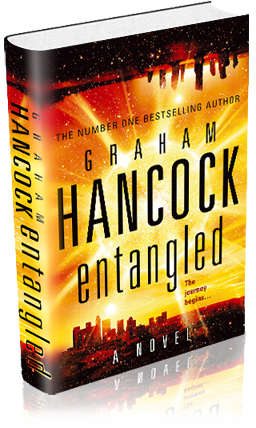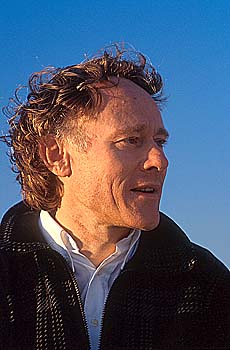![]()
![]()
Graham
Hancock's first novel is likely
to do better than his non-fiction books
Entangled book cover |
Graham Hancock |
Switching from creating non-fiction books to works of fiction is not necessarily a good move for any author, as it might lead to aspersions being cast on your previous portrayals of true life adventure. That is what I have always believed, which is why I shall never write a novel. Better to do it the other way round - write non-fiction after years of writing fantasy thrillers. Just ask Whitley Strieber, whose book Communion, about his UFO experiences, was a worldwide bestseller back in 1987.
Graham Hancock, however, has decided to take the plunge and change from writing first person travelogue style books on ancient mysteries to writing his first book of fantasy. Entitled Entangled, it is a adventure that features time-slip situations with communication across time between an ice age shamaness, and a female in a modern day context. In a way, Entangled might be seen as quantum take on the tried and tested formula of the wise teacher instructing a young novice on the ways of the ancients, a la Carlos Castaneda in his teachings of Don Juan series of books, or Brian Bates in his classic psychic questing epic The Way of Weird.
Yet for Graham Hancock the realms between fiction and fact blur as Entangled non-stop action narrative introduces a wealth of important themes in the understanding of the human mind and its relationship to the unseen world around us. Everything from the nature of consciousness to out-of-body experiences, near-death experiences, Ayahuasca, DMT, telepathy and parallel realms are addressed in a manner that Graham might be expected to address in a work of non-fiction. Indeed, what we have here is a natural progression from his last book, Supernatural, which introduces many of these themes together for the first time.
In my opinion, this is probably the right move for Graham Hancock, who has spent the last two decades recording and promoting the mysteries of the past and present in books such as Fingerprints of the Gods, The Mars Mystery, Underworld and Heaven's Mirror. All these books have been very successful, showing the immense interest in these subjects worldwide. They remain hot topics as we head towards the big 2012 hoedown, where anything from an alien invasion to the Rapture is expected by leading protagonists of the new age movement. But what of the world after 2012, if nothing happens? How will this leave the ancient mysteries subject? Graham knows, as I do too, that following the non-events of the millennium there was an enormous slump in interest in books on ancient mysteries, not just in sales, but also from the publishing perspective worldwide. Many key authors writing on this subject were dropped by their long-term publishers. This had a huge impact on the nature of books being written on this subject, with some authors retiring completely from the field. Those that did soldier on found new publishers, generally specialist publishing houses in the USA, or started publishing books themselves.
Today mainstream publishers are even more cautious about taking on books about ancient mysteries, and this is a situation that will only worsen as 2012 looms, and so looking to take on the same subject matter from a slightly different angle is no bad thing. Moreover, writing fiction allows you to embrace new audiences and market places which are rarely exposed to such in depth understandings of the mysteries of life (other than through blockbuster thrillers by the likes of Dan Brown, that is).
Graham Hancock's immense success as a non-fiction writer, along with his background as a investigative journalist, should ensure that Entangled is a great success. It is published in the UK by Random House, and is scheduled for release in the USA through Disinformation in October.
But
is the book any good?
The answer to this is that
it is excellent. I don't really read novels - I just don't get time, but I found
Entangled drew me in and compelled me to turn the pages from start to finish.
The characters are realistic, and you become sympathetic with their plight almost
immediately. Plus there is the all important manner in which the entangled nature
of the two girls, one from the past and one in the present, is played out across
a time span of 24,000 years.
Graham obviously believes, as I do, that the past, present and future are all mutable on certain levels, and that one can influence the other - the future can influence the past and present, the past can influence the present and future, and us in the present time can influence both the past and present. Beyond the physical the concept of time has a different sets of rules.
I presume Graham believes this, but in a way it doesn't matter, as intuitively this feels right, both for the reader and the quantum understanding of the universe and its interaction with other parallel existences. And we can be certain that many of these ideas came to Graham not just through his many years of trying to understand the mysteries of the universe, but also from his many ayahuasca experiences. These, as a concept, are brought out very clearly in the text, and you just know that this is based on what Graham experienced himself when under the influence of the substance the native peoples of the Amazon call the "Vine of the Dead".
What
I think is most clever about this book is that Graham uses this new understanding
of the nature of how the past, present and future can coexist, and influence each
other, to decide the fate of the very last outpost of Neanderthals, or Uglies
as they are called in the book. Since we, today, do not know how they met their
demize, whether they were wiped out by incoming Cro-magnon peoples, i.e. us homo
sapiens, or they befell some other fate, is in the hands of the two heriones,
who connect acros vistas of time to decide the Neanderthals ultimate fate. What
I like is that Graham is virtually saying through the pages of the book that even
now we, ourselves, can influence the past if it is unwritten, i.e. hasn't been
set in stone.
Thus simply by reading the ending of this book, which I won't
give away, it is possible that its conclusions could influence or even change
what little we actually know about the demize of the last Neanderthals living
in northern Spain some 24,000 years ago. A new understanding of their fate might
even lead to new evidence ensuring that this theory, as opposed to any other,
is the one that becomes most valid, and even ends up in the text books. Our own
ideas of the past influence what we find as evidence in order to confirm any one
theory, suggesting that whatever theory is the most powerful wins the day. It
is not a case of whether one is right and the other wrong, purely the fact that
enough power behind the strongest one will validate it above all others, in this
way reality can be changed, or updated, in its favour. If another theory comes
along that appears to fit the evidence even better, it would need an awful lot
of quantum energy behind it to ensure that reality bends in its favour in order
to give it validity.
Once again, this a powerful concept of reality, one that I have acknowledged for a very long time. In short, you can quite literally make up reality if you try hard enough...
There
are many themes in this book that are meant to hit the creative, artistic, as
opposed to the purely interlectual, side of the brain, and in this way it works
a treat. I can recommend reading Entangled most assuredly; it could quite
literally change the way we perceive the world in the past, present and future.
Plus it is a lot better written than Dan Brown books!
For everything you need to know about its release and availability go to:
http://www.grahamhancock.com/entangled/
See also the Offical Entangled page at http://entangledthebook.com/
The
first four chapters of Entangled are online at:
http://www.entangledthebook.com/videos.php
To
see a video trailer about the book, click below:
To
see a video of Graham reading the first chapter of Entangled, click below:
Entangled
reading: Chapter One: Part One
Entangled reading, First Chapter: Part two
![]()
![]()

